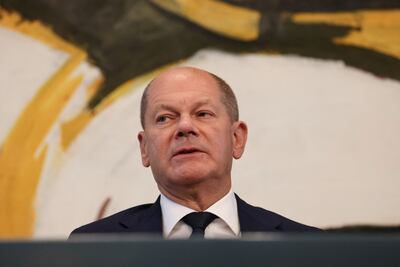A relief plan worth €65 billion ($65 billion) was announced in Germany on Sunday as the country and continent attempt to tackle rampant inflation, in part caused by soaring gas prices.
The German plan to help millions of households includes a vow to cap huge profits made by energy companies during the current crisis.
There will also be increased payments to pensioners, students, parents and the unemployed, and action to slow the astronomical pace at which electricity prices are rising.
“Germany stands together in a difficult time. As a country, we will get through this difficult time,” Chancellor Olaf Scholz said.
The war in Ukraine has helped to fuel inflation worldwide. In Germany, the fallout was exacerbated by Russia reducing the volume of gas it pumps.
The EU accused Russia of using energy as a weapon when state energy company Gazprom said the Nord Stream 1 pipeline would remain closed because of a reported oil leak in a turbine that needed urgent repairs.

It vowed to accelerate energy independence despite deepening concerns over gas supplies to the continent this winter.
“We have made all the decisions to make sure that our energy supply is secure, even though we are challenged by what Russia is doing,” Mr Scholz said.
“And we have made all the decisions that are necessary to make sure that we link arms, that no citizen is left alone.
“[President Vladimir] Putin’s Russia has become in breach of contract and it has not fulfilled its supply contracts for a long time. Something that was always true in the Cold War no longer applies. Russia is no longer a reliable energy supplier. That is part of the new reality.”
Mr Scholz added that Germany's earlier preparations meant that it would get through the winter heating season.
Speaking at a news conference with his governing coalition leaders from the Greens and the pro-business FD, Mr Scholz said he was “very aware” many Germans are struggling to cope.
The government plans to extend one-off aid payments to groups, including retirees and students.
To keep energy costs lower for households, the government announced a “brake” on energy prices, saying it plans to offer a to-be-determined basic amount of energy to all at a lower rate.
The government will also develop a successor to its “nine-euro ticket,” a nationwide ticket allowing unlimited travel on local and regional public transit.
Additional measures planned as part of the package include higher subsidies for families with children, a reform of housing subsidies and larger payments for low-income individuals receiving government aid.
Mr Scholz’s government has faced pressure in recent weeks to indicate how it planned to follow through on its promise to help consumers shoulder the costs of inflation and higher energy prices.
In addition to rising wholesale prices for natural gas caused by Russia’s invasion of Ukraine earlier this year, German consumers will have to pay a new surcharge to prop up energy companies scrambling to find new supplies on the global market.
In recent weeks, the government had announced other actions to aid consumers, including the one-time payments of 300 euros for workers and lowering value-added tax on gas from 19 per cent to 7 per cent until the end of March 2024.


